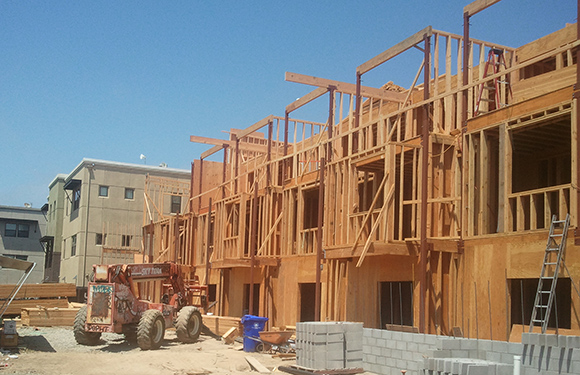
Construction in Oakland, California (Photo Credit: Mike Linksvayer/Flickr)
With only a few months remaining in the legislative session, the California Economic Summit sent a letter to the Governor and Legislature today saying state leaders are not doing enough to address California’s expanding housing catastrophe—and urging them “to pass and sign into law a set of solutions that will match the scale of the state’s housing crisis.”
The letter, signed by the leaders of the Summit Housing Action Team and the co-chairs of the Summit’s founding organizations, California Forward and the California Stewardship Network, notes that roughly 50 housing bills are still moving through the Legislature.
“But no comprehensive package has emerged—or even been publicly discussed—that will make the full range of policy changes necessary to move the needle on housing,” the letter says. “We are concerned these solutions are not yet sufficient to address the dramatic undersupply of housing—of all kinds—that is at the root of this problem.”
After spending more than a year working with stakeholders on a plan for taking on what it calls the One Million Homes Challenge, the Summit sent a letter to state leaders in April emphasizing the need for “comprehensive, aggressive action” in this session to expand access to affordable housing and increase supplies of market-rate housing near jobs and transit. The Summit highlighted all of the major state policy levers that would be needed to bring supplies back into balance with demand, including a set of new incentives to encourage local governments to approve more housing and increased enforcement for jurisdictions that were still not building their fair share.
Several months later, though, the housing debate has not significantly progressed. While one important new housing funding bill moved out of the Senate last week, the state budget was passed in June without any new funding or focus on housing. A large number of housing bills are moving, but the Summit letter concludes that substantial progress is being made mostly on proposals to hold local governments accountable for producing more housing. There is not nearly enough progress, meanwhile, on incentives that will get more communities to say yes to housing. As the Summit letter puts it:
“While the Senate has now taken action on one important proposal, none of the major bills to provide a permanent source of funding for affordable housing , e.g. SB 2 (Atkins) and AB 71 (Chiu), raise revenue sufficient to address the scale of the crisis. The few proposals that offer production incentives, e.g. AB 56 (Holden) and AB 1568 (Bloom), don't have money behind them. New investments in housing programs, e.g. AB 45 (Thurmond) and AB 74 (Chiu, Santiago, Bonta), lack Administration support and were not included in this year’s budget. This year’s streamlining efforts, e.g. SB 35 (Wiener), AB 1598 (Mullin), and SB 540 (Roth), are mostly voluntary, likely to add to the cost of housing, and workable in too few communities.”
The Summit includes an appendix in its letter with some analysis of how this can change—highlighting the major bills that advance elements of the One Million Homes Framework and identifying ways these proposals could be broadened to maximize their impact:
“To be effective, any final housing package must include a permanent source of funding for affordable housing (and ideally additional incentive funding to support local infrastructure associated with both affordable and market-rate housing, as well). It needs to provide real fiscal incentives for communities to approve more housing of all types. And it must contain the cost of development enough to allow more builders to build, accelerating production and bringing down the price of housing.”
Summit leaders believe there is still time to do this right.
The Governor and Legislature have demonstrated their ability this year to respond decisively and effectively to some of the most pressing issues facing California. Members have talked for months about the need to slow skyrocketing housing costs, support the growing numbers of people now living on the streets, and protect millions of Californians from being pushed into poverty because of rising rents and home prices.
All that is needed now is focus and commitment—and the political willpower to finally do something about housing.

